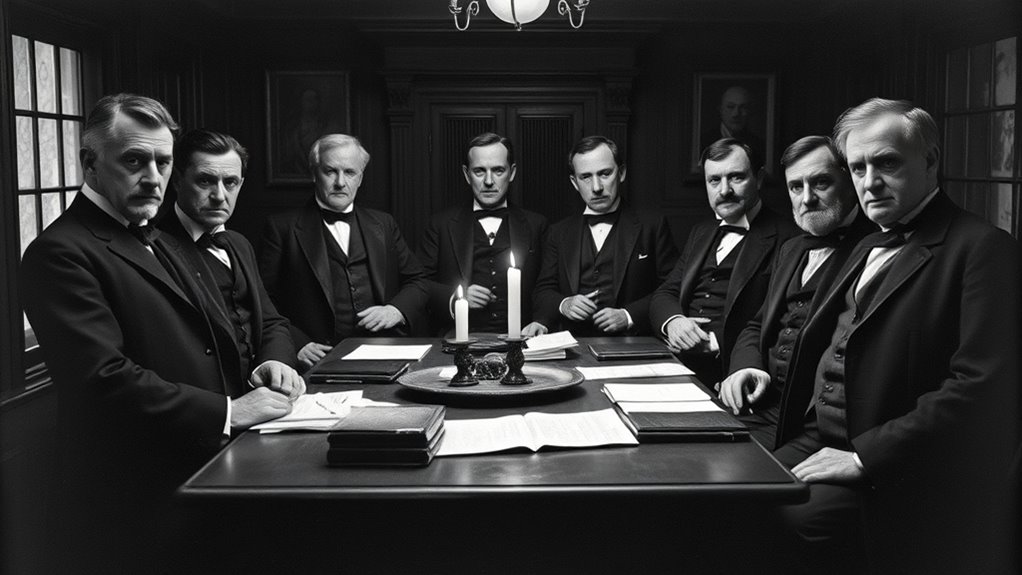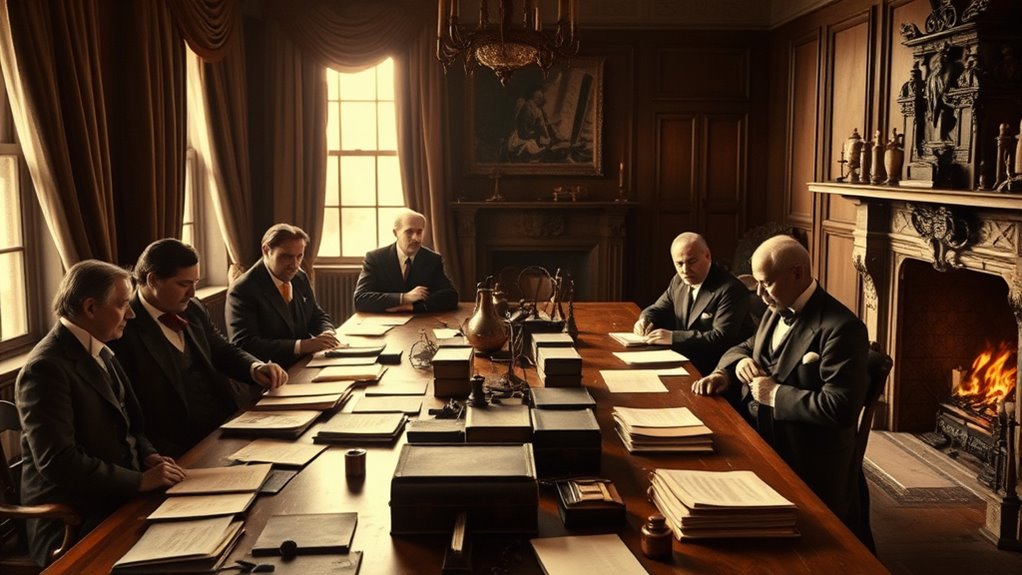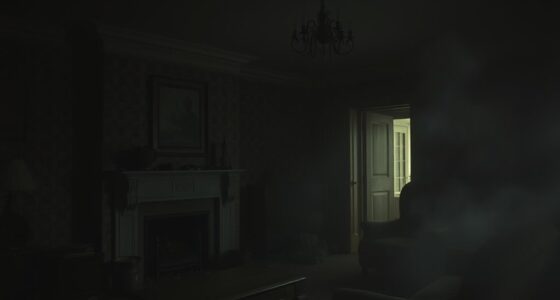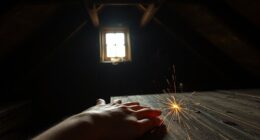In 1882, a group of dedicated thinkers founded the Society for Psychical Research to scientifically explore paranormal phenomena amid widespread spiritualist interest and skepticism. Motivated by curiosity and a desire for objective investigation, they aimed to apply rigorous scientific methods to phenomena like ghosts and telepathy. Their focus was on credibility and transparency, setting the foundation for future research. If you want to understand how they shaped scientific standards, more details await you.
Key Takeaways
- Founded in 1882 to scientifically investigate phenomena challenging conventional science, amid rising spiritualist movements.
- Established by prominent individuals motivated by curiosity and skepticism to explore paranormal claims objectively.
- Aimed to develop rigorous, empirical methods for studying phenomena like ghosts and telepathy.
- Faced skepticism from the scientific community and public, challenging experimental controls and methodology.
- Laid the groundwork for psychical research, emphasizing transparency, reproducibility, and ethical standards.
Origins and Context of the Society’s Formation

The Society for Psychical Research was founded in 1882 amid growing interest in understanding phenomena that challenged conventional scientific explanations. During this time, spiritualist movements gained popularity as many sought proof of life after death and supernatural occurrences. However, societal skepticism was widespread, with critics dismissing such claims as tricks or delusions. You might have noticed how these conflicting views created tension between believers and skeptics. The society emerged to bridge this divide, aiming to investigate psychic phenomena scientifically and objectively. Its founders sought to examine spiritualist claims carefully, without bias, to determine whether they had a basis in reality. This context of fascination mixed with doubt set the stage for the society’s mission to understand the unexplained. Scientific investigation became central to their approach, reflecting a shift towards empirical methods in studying the paranormal. Additionally, the society emphasized empirical methods to ensure their research adhered to rigorous standards.
Key Founders and Their Motivations

Several prominent individuals played crucial roles in establishing the Society for Psychical Research, each driven by a desire to investigate paranormal claims objectively. Many founders were influenced by the spiritualism movement, which gained popularity in the late 19th century, fueling public interest in life after death and supernatural phenomena. However, their motivation was not to endorse spiritualism blindly but to apply scientific rigor to these claims. Their intellectual curiosity pushed them to question assumptions and seek evidence beyond superstition or bias. These founders believed that understanding unexplained phenomena required systematic investigation, blending open-mindedness with skepticism. Their goal was to uncover truths about the mind, consciousness, and the supernatural, motivated by a genuine desire to expand scientific knowledge and challenge existing beliefs. The use of projectors and other scientific tools exemplified their commitment to empirical research and objective analysis. They also sought to establish a platform where researchers could collaborate and share findings in a structured manner, emphasizing the importance of methodical inquiry in their investigations.
The Society’s Mission and Objectives

The Society’s mission is to explore paranormal phenomena with an open mind while applying rigorous scientific methods. You’re encouraged to contemplate how this approach aims to distinguish genuine evidence from speculation. Ultimately, the objectives focus on advancing understanding through careful investigation and research. Emphasizing the importance of a scientific approach ensures findings are credible and replicable. Incorporating systematic investigation methods helps maintain objectivity and accuracy in the study of unusual phenomena. Maintaining mental clarity and a balanced perspective is essential for objective inquiry and interpretation. Incorporating peer-reviewed studies and primary sources further strengthens the credibility of investigations and supports the Society’s commitment to scientific integrity.
Exploring Paranormal Phenomena
Because understanding paranormal phenomena has long intrigued humanity, the Society for Psychical Research dedicates itself to investigating these mysteries systematically. You explore a wide range of phenomena, from ghosts to telepathy, aiming to uncover truth beyond superstition. During the spiritualism debates, you encounter strong public skepticism, with many dismissing spiritualist claims as fraud or illusion. Your goal is to approach these claims scientifically, separating genuine evidence from trickery. By documenting experiences and conducting experiments, you seek to understand the unknown while maintaining objectivity. Incorporating scientific methods ensures that investigations remain credible and grounded in empirical evidence. Emphasizing rigorous investigation helps to uphold the society’s commitment to credibility and scientific integrity. The society’s mission is to shed light on these phenomena without bias, fostering a balanced view that respects both curiosity and scientific rigor. Employing systematic research techniques further enhances the reliability of findings, encouraging transparency and reproducibility. Ultimately, you aim to expand our understanding of the unexplained, respecting both skepticism and genuine inquiry.
Advancing Scientific Inquiry
To truly advance scientific inquiry into paranormal phenomena, the Society for Psychical Research commits itself to rigorous, methodical investigation. You recognize that understanding psychic phenomena requires unbiased research and skepticism. The society aims to separate fact from fiction within the spiritualism movement, ensuring claims are tested scientifically. By doing so, you contribute to a more credible approach to studying these phenomena. The society’s objectives include:
- Conducting controlled experiments to verify psychic phenomena
- Challenging assumptions in the spiritualism movement
- Promoting transparency and reproducibility in research
- Building a scientific community open to paranormal investigation
- Discouraging sensationalism and pseudoscience
- Emphasizing methodical investigation to ensure accurate results
- Embracing a scientific approach that values empirical evidence over speculation
- Supporting the development of standardized research protocols to maintain consistency across studies
Through these efforts, you help legitimize investigations into paranormal claims, fostering progress and trust in the scientific study of psychic phenomena. Regular filter maintenance and adherence to proper procedures further support the society’s commitment to credible research.
Early Investigations and Methodologies

Have you ever wondered how the Society for Psychical Research approached studying unexplained phenomena? They prioritized rigorous experimental protocols to guarantee their investigations were systematic and unbiased. Researchers carefully designed experiments to test phenomena like telepathy and materializations, controlling variables to rule out deception. Data analysis was central; they meticulously recorded observations and sought patterns that could support or challenge claims. By applying scientific methods, they aimed to distinguish genuine phenomena from tricks or coincidences. Their approach emphasized replication, transparency, and critical scrutiny. This disciplined methodology helped establish a foundation of credibility, setting their investigations apart from sensationalism. Through these early efforts, the society sought to explore the unknown with a scientific mindset, balancing curiosity with skepticism.
Challenges and Criticism Faced by the Society

The Society for Psychical Research faced significant skepticism from the scientific community and the public, which often questioned the validity of their investigations. Many doubted their methods and whether they could produce reliable results. You might encounter criticisms like:
- Public skepticism questioning the society’s credibility
- Methodological criticisms about experimental controls
- Doubts over the reproducibility of findings
- Allegations of bias or misinterpretation
- Resistance from mainstream science fearing fringe associations
These challenges made it hard for the society to gain widespread acceptance. They struggled against doubts about the scientific rigor of their work and the legitimacy of phenomena they studied. Despite this, they persisted, aiming to establish a more credible approach to investigating the unknown.
Legacy and Impact on Future Research

Your understanding of the Society’s legacy begins with how it helped establish the scientific method in psychical research. This approach influenced the development of parapsychology as a formal discipline and shaped future investigations. Additionally, the Society’s ethical standards continue to guide responsible research in this challenging field.
Scientific Method Adoption
How did the Society for Psychical Research shape the future of scientific inquiry? By prioritizing experimental rigor and employing statistical analysis, it set new standards for investigating the paranormal. You see, they emphasized systematic, replicable experiments, avoiding anecdotal evidence. This commitment encouraged future researchers to approach psychic phenomena with objectivity. The Society’s influence is clear in how it promoted:
- Rigorous experimental protocols
- Use of statistical tools for validation
- Critical peer review processes
- Emphasis on reproducibility
- Balancing skepticism with open-minded inquiry
These practices helped embed scientific methodology into the study of unexplained phenomena. As a result, the Society’s legacy pushed future research to be more disciplined, credible, and methodologically sound, shaping the foundation for modern scientific investigation in the field.
Influence on Parapsychology
Have you ever wondered how the Society for Psychical Research shaped the field of parapsychology? Your answer lies in its efforts to scientifically investigate psychic phenomena, moving beyond spiritualism debates that often lacked empirical evidence. The society’s rigorous research methods and open-minded approach laid a foundation for future studies, encouraging skeptics and believers alike to explore paranormal claims critically. Its work challenged the sensationalism surrounding spiritualism, pushing the field toward more systematic investigation. The Society’s legacy influences modern parapsychology by promoting careful experimentation and evidence-based analysis. Today, you can see its impact in ongoing research that seeks to understand psychic phenomena with scientific integrity, ensuring the pursuit remains rooted in both curiosity and credibility.
Ethical Framework Development
Building on the Society for Psychical Research’s commitment to scientific inquiry, establishing a solid ethical framework became a key aspect of its legacy. You recognize that moral considerations and ethical dilemmas shape research practices and public trust. The Society emphasized responsible investigation, safeguarding participants, and transparency. It encouraged researchers to:
- Prioritize honesty over sensationalism
- Respect the privacy and dignity of subjects
- Avoid sensational claims without evidence
- Address potential biases and conflicts of interest
- Ensure experiments adhere to moral standards
These principles fostered integrity and set a precedent for future research. By confronting ethical dilemmas head-on, the Society established a foundation that balances scientific curiosity with moral responsibility, influencing subsequent studies and safeguarding the credibility of psychical research.
Frequently Asked Questions
How Did Societal Attitudes Toward Spiritualism Influence the Society’S Formation?
You see, societal attitudes toward spiritualism greatly influenced the society’s formation. Public perception was mixed—some saw spiritualism as a genuine connection to the afterlife, while others viewed it skeptically. Cultural influences fueled curiosity and skepticism alike, prompting serious inquiry. Recognizing the need for scientific investigation, people like members of the society sought to understand these phenomena objectively, shaping the society’s mission to explore spiritualism with rational skepticism.
Were There Any Notable Disagreements Among the Founding Members?
Imagine you’re exploring early psychical research and wonder if founding members clashed. You’d find that member rivalries and methodological debates fueled disagreements, especially over how to investigate claims. Some members favored a scientific approach, while others leaned toward spiritual explanations. These tensions shaped the society’s direction, making disagreements a crucial part of its development, much like a modern startup steering team dynamics.
What Specific Experiments Were Considered Groundbreaking at the Time?
You’re curious about groundbreaking experiments in paranormal phenomena, right? Back then, researchers used innovative experimental methodologies to investigate things like telepathy, apparitions, and psychokinesis. They conducted controlled tests, such as card-guessing experiments and spirit communication sessions, to gather empirical evidence. These efforts aimed to bring scientific rigor to the study of the paranormal, making their work pioneering in establishing credible research methods for phenomena that skeptics often dismissed.
How Did the Society Fund Its Early Investigations?
Imagine uncovering mysteries beyond the ordinary, where your curiosity fuels discovery. You’d find that the society’s early investigations relied on diverse funding sources, including private donations and memberships. Early grants played a vital role, providing the financial boost needed for pioneering experiments. These funds, secured through dedicated supporters, allowed you to explore the unknown, pushing the boundaries of scientific inquiry into the supernatural and psychic phenomena.
Did the Society Collaborate With Other Scientific Organizations Initially?
You might wonder if the society initially collaborated with other scientific organizations. Yes, it did engage in interdisciplinary partnerships, working alongside scientists from different fields to lend credibility to its investigations. These collaborations helped with public outreach, making its research more accepted and understood by the wider community. Such efforts fostered a more open dialogue about psychical phenomena, bridging gaps between scientific skepticism and exploring the unknown with a collaborative spirit.
Conclusion
As you reflect on the Society’s early days, imagine a flickering candle in a shadowed room, casting tentative light on the unknown. Despite storms of skepticism and doubts like chilling winds, you see how their unwavering curiosity ignited a path through darkness. Their quest for understanding, like stars piercing the night sky, continues to inspire. You realize that their pioneering spirit forever changed how we explore the mysteries beyond what we can see.









